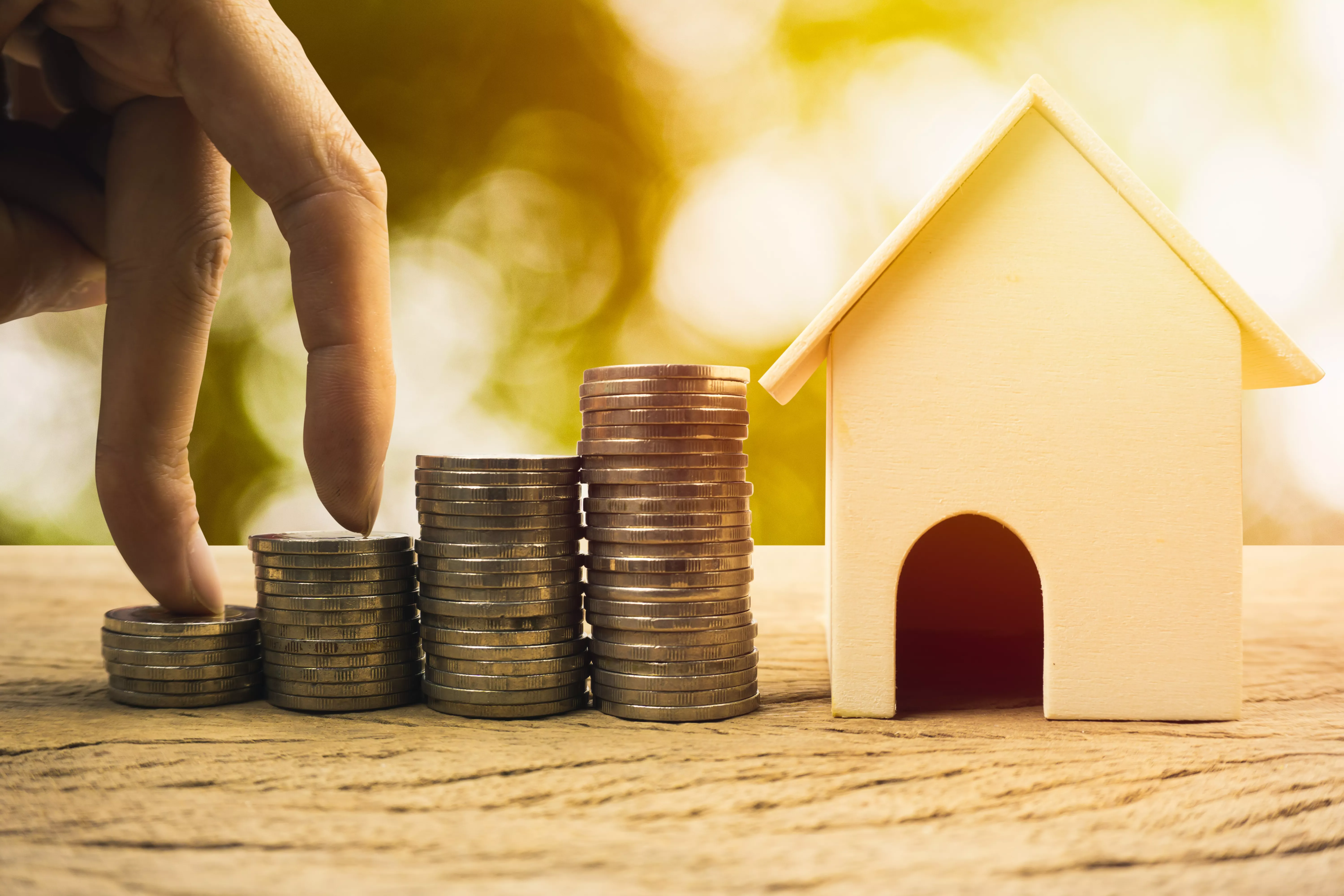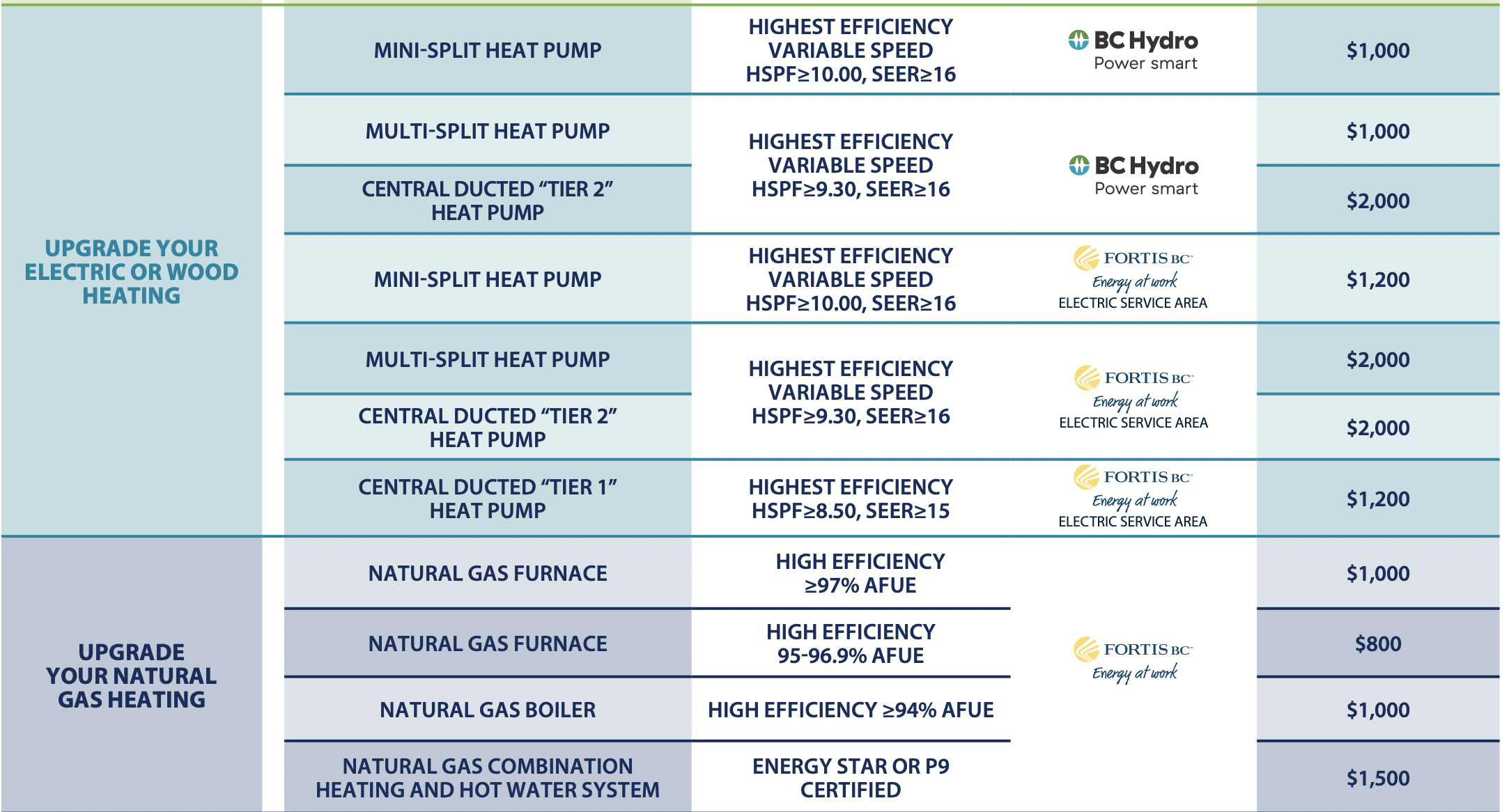Homeowners in BC are now eligible for home energy efficiency upgrade rebates of up to $10,000 with many municipalities offering top-up rebates

As part of the government initiative to support high performance homes, many rebates are available for homeowners who want to undergo home renovations to improve their home energy efficiency and reduce their home carbon emissions. Energy efficiency renovations are a great pathway for homeowners to reduce their monthly home energy bill and increase their property value. Our research at Properate shows that over the past two years with more people working from home, an average energy bill per Canadian household has increased by 30%. As a result, more homeowners want to upgrade their home, improve their house ventilation, save and conserve energy. If you are concerned about saving heat energy and your energy savings, there are many rebates available to help you with your home upgrades (i.e BC Hydro rebate, FortisBC rebate).
Over the past two years , an average energy bill per Canadian household has increased by 30%.
Rebates vary based on home heat system fuel type . Generally, electrically heated homes are funded by BC Hydro rebates, while natural gas heated homes are funded by FortisBC rebates and oil, propane or natural gas heated homes switching to electric space or water heating are funded by the CleanBC Better Homes rebates program.

Heating Systems overview. Source
It is important to note that most of the rebate programs mentioned below require a pre- and post-renovation Energuide evaluation of the home performed by a certified energy advisor. Here is a guide for the rebates available provincially.
Fortis BC Rebates
ortisBC is offering up to $1,000 when replacing an old gas furnace with an eligible high-efficiency ENERGY STAR® model. Homeowners are eligible for one primary space heating system rebate per home, regardless of the number of systems installed. For example, you cannot get a rebate for a furnace and heat pump, even if you install a new dual fuel heat pump system. In addition, it is important to look at the Annual Fuel Utilization Efficiency (AFUE) rating of the new system . Depending on AFUE rating, the rebate eligibility changes. If you have a connected thermostat, you would be eligible for an additional $150. FortisBC also offers rebates to income-qualified homeowners who install an eligible natural gas water heater. Depending on the heater type (storage tank, condensing tankless or condensing storage tank), income-qualified homeowners could be eligible for up to $2,500 in rebates. Income eligibility is determined based on the household size. Starting with a household size of 1 person, the maximum eligible income is $34,000. This goes up incrementally (approximately additional $10,000 in income for additional 1 household in size). There are other rebate programs for income-qualified homeowners available. For a full list, visit FortisBC website. Besides the above FortisBC rebates, upgrading your furnace or doing other energy efficiency upgrades will make you eligible for the Home Energy Improvement Bonus program by CleanBC Better Homes.
BC Hydro Rebates
BC Hydro offers multiple rebates including home renovation rebates for insulation, windows, doors, space heating and water heating, rebates for the purchase of energy efficient products, fuel switching rebates and rebates for income-qualified households (i.e free energy saving kit and free energy coaching). For BC Hydro home renovation rebate, you can get up to $10,000 in rebates for making energy efficiency upgrades which includes rebates of up to $3,000 for windows and doors, $5,500 for insulation, $2,000 for heat pumps and rebates up to $1,000 for heat pump water heater. Rebate offers and amounts vary depending on whether your home uses electricity, natural gas, oil or propane as the primary heating source. Low or moderate income households could qualify for a free energy saving kit from BC hydro. Each kit includes simple, energy-saving products that you can install yourself. With this kit, homeowners can seal up the drafts around the home, save energy, and reduce the home's water use. The kit contains LED bulbs, weatherstripping to reduce drafts around windows and doors, high efficiency showerheads, water-saving tap aerators, LED night light, fridge and freezer thermometer.

Rebates overview. Source
Home Energy Improvement Bonus Program
The Home Energy Improvement Bonus provides $750 to $2,000 for installing three or more eligible energy efficiency upgrades between two EnerGuide home evaluations. Receive $20 for every percentage you improve your EnerGuide rating (Gigajoule/ year) between your pre- and post-upgrade EnerGuide home evaluations. For example, if your pre-upgrade EnerGuide rating was 250 GJ/year and your post-upgrade EnerGuide rating is 125 GJ/year which is 50% improvement then multiply that percentage number by $20 (50 x $20) to get an estimate of what incentive you will receive ($1000 in this case). This is where the Properate report comes in handy to show you the potential energy efficiencies and potential home energy savings. The upgrades eligible for such bonus include insulation, water heater, primary/ secondary heating system, windows and doors. Other home energy saver upgrades might not be eligible for this bonus but they will help you improve your Energuide score which would make you eligible for the bonus.
Heat Pumps Rebates
Heat pumps can help reduce your home energy consumption, operational costs, and environmental impact associated with heating and cooling your home. This is especially true with homes that are heated by electric baseboards, fuel oil, or propane. Heat pumps can also help improve home thermal comfort. Two common types of heat pumps used for space heating in low-rise residential applications are Air Source Heat Pumps (ASHPs) and Ground-Source Heat Pumps (GSHPs). Depending on the season, ASHPs absorb heat from outside air during winters then use refrigeration to transfer incoming heat for home heating. During summer months, they absorb heat and reject it outdoors. ASHPs are the most common type of heat pump currently installed in Canada. GSHPs transfer heat to and from the ground, which maintains a nearly constant temperature year-round. Although they are more efficient than ASHPs, GSHPs are also substantially more expensive. Heat pumps are a great upgrade solution as they last longer, have fewer maintenance issues, reduce home emissions and result in improved utility bill savings.Despite being on the more expensive side, heat pumps also help contribute to comfortable indoor environments, with fewer cold spots and more even temperature distribution. Fortunately, there are many rebates to support homeowners. Besides the provincial rebates, depending on your location, your city/ district might have a top-up rebate program to cover your heat pump expenses. The following municipalities have top-up rebate program in place: Vancouver ($2000/ $6000), Kelowna ($2000), North Vancouver ($2000), Whistler ($2000), Kamloops ($350), Duncan ($350), View Royal ($350), Sidney ($350), Colwood ($350), Cowichan ($350), New Westminster ($350), Powell River ($350) and Nanaimo ($350).
Making the most out of available rebates
When you are thinking about undergoing a home renovation, you need to look at your home as a system. Renovating one part of your home can positively or negatively affect other parts of the system. A holistic approach to the home renovation process will allow you to make the most out of the available rebates. First, start by getting your free preliminary home energy assessment from Properate. The report will help you explore your energy efficiency upgrade options, the approximate cost and eligible rebates. Second, book your free consultation. Third, contact us if you would like to proceed with an energy evaluation of your home by a certified energy advisor.
